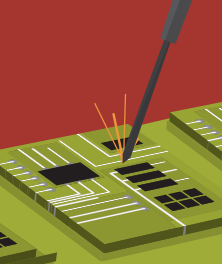Contact Information

- Division
- Business and Technology
- Dean
- Susan Lucyga (Interim)
- Associate Dean
- Darlene Jackson

- Division Office
- B 3, Rocklin Campus
Overview
Mechatronics is the study of electronics, mechanics and computer control in one cohesive hands-on, project-based program. The field of Mechatronics includes robotics, industrial automation, industrial process control and electro-mechanical systems. Mechatronics systems include ATMs and copy machines, elevators, medical diagnostic equipment, automated package handling, ski lifts, water processing facilities, industrial robots and large-scale food and beverage manufacturing. There are associate degree and certificate options. More information can be found at the Sierra College Mechatronics Department website: http://www.realskillsrealjobs.com.
Faculty
Michael F. Halbern
Professor, Mechatronics
B.A., California State University, Long Beach
M.A., California State University, Long Beach
Tony J. Osladil
Professor, Mechatronics
B.S.E.E., University of Detroit Mercy
Mechatronics Industry Advisory Committee
- Ace Anaya, Manager, Patterson Dental, Roseville
- Bruce Ballard, Engineering Manager, Conquip, Inc., Gold River
- Nick Bruno, President, Harris and Bruno International, Roseville
- Bryan Buchanan, Wastewater Operations Manager, City of Roseville
- Rob Burgard, Representative, SMC Corporation, Auburn
- Nathanael Griesert, Design Engineer, NSC Portable Power Systems, Grass Valley
- Aiden Hebert, Engineer, Mesotech, Rancho Cordova
- David Kennedy, Engineer, Michrom Bioresources, Auburn
- David Long, Engineer, Aerojet, Rancho Cordova
- Harry Lum, Senior Engineer, AJA Video Systems, Grass Valley
- Mitchell Patrick, Maintenance Manager, Vanelli Foods, Rocklin
- Jim Purcell, Engineer, Line 6, Rocklin
- Dan Quarton, Manager, Sierra Pacific Industries, Lincoln
- Mike Robinson, Private Consultant, Grass Valley
- Steve Sanders, Engineer, PACE-Americas, Grass Valley
- Tim Stockwell, Engineer, Hewlett-Packard, Roseville
- David Stroud, Training Manager, Anheuser-Busch, Fairfield
- Carrie Wetter, Recruiting Manager, Union Pacific Railroad, Roseville
- Kay Whitaker, Manager, Ceronix, Inc., Auburn
Degrees/Certificates
Associate Degree
Certificate of Achievement
Skills Certificate
Mechatronics Technology
AA or AS Degree and/or Certificate of Achievement
Successful completion of the curriculum in Mechatronics Technology prepares students for positions in businesses and industries that manufacture, utilize, or repair equipment incorporating electronics, mechanics, pneumatics, hydraulics and programming. For the degree, students must fulfill the following major requirements with grades of “C” or better, complete a minimum of 60 degree-applicable semester units (12 of which must be completed at Sierra College) with a grade point average of at least 2.0 and complete one of the following three general education patterns:
- Sierra College Associate Degree Requirements;
- California State University General Education Breadth pattern;
- Intersegmental General Education Transfer Curriculum (IGETC).
A certificate is designed to provide career technical skills; it is not equivalent to an associate degree.
Required Courses in the Recommended Sequence
| Code | Title | Units |
|---|---|---|
| MECH 0004 | Fundamentals of Mechatronics | 4 |
| MECH 0010 | Fundamentals of Electronics | 4 |
| MECH 0014 | Fabrication Techniques | 2 |
| MECH 0025 | Personal Computer Configuration and Repair | 4 |
| MECH 0044 | Mechatronic Processes and Materials | 2 |
| MECH 0054 | Mechatronics System | 4 |
| MECH 0090 | Microcontroller Embedded Systems | 4 |
| Total Units | 24 | |
Electro-Mechanical
Skills Certificate
Completion of the skills certificate provides students with the underlying principles and hands-on techniques of basic electronics and basic mechanics, thereby preparing them for entry-level electro-mechanical technician positions. Emphasis is on use of electronic test equipment for troubleshooting as well as tools and processes of manufacturing as applied to industrial materials. A skills certificate is designed to provide career technical skills; it is not equivalent to an associate degree.
Required Courses
| Code | Title | Units |
|---|---|---|
| MECH 0001 | The Science of Electronics | 3 |
| MECH 0010 | Fundamentals of Electronics | 4 |
| MECH 0044 | Mechatronic Processes and Materials | 2 |
| Total Units | 9 | |
Courses
Understanding course descriptions
MECH 0001. The Science of Electronics
Units: 3
Formerly known as CIE 1
Hours: 54 lecture
Survey of electronics technology presented in the context of the principles of science. Application of the scientific method to topics ranging from basic circuits to microprocessors, including electronic music, robotics, electric vehicles, fiber optics, semiconductors, and medical imaging. Scientific, historical, political, and economic connections to electronics technology. (CSU)
MECH 0004. Fundamentals of Mechatronics
Units: 4
Formerly known as CIE 4
Hours: 108 (54 lecture, 54 laboratory)
Introduction to mechatronics, which combines electronics, mechanics, pneumatics, and hydraulics, under computer control; as applied to robotics and automation. Presented through hands-on, project-based experiments that demonstrate industrial applications. (CSU)
MECH 0008. Introduction to Electronics
Units: 3
Formerly known as CIE 8
Hours: 54 lecture
General principles, concepts, terminology, and applications of electronics in the context of mechatronics technology. (CSU)
MECH 0010. Fundamentals of Electronics
Units: 4
Formerly known as CIE 10
Hours: 126 (54 lecture, 72 laboratory)
A fundamental study of electronic devices, circuits, and systems as applied to robotics, computers and industrial automation. Presented through hands-on, project-based experiments. (CSU)
MECH 0014. Fabrication Techniques
Units: 2
Formerly known as CIE 14
Hours: 72 (18 lecture, 54 laboratory)
Introductory course covering the function and construction of electronic projects and equipment. Includes design and fabrication of enclosures, single and double-sided printed circuit boards, safe use of power and hand tools, through-hole, point-to-point and surface-mount soldering, rework techniques, and wiring. Research component vendors and develop a spreadsheet-based Bill Of Materials. (CSU)
MECH 0025. Personal Computer Configuration and Repair
Units: 4
Formerly known as CIE 25/CIS 25/CST 25
Hours: 108 (54 lecture, 54 laboratory)
Concentrated study of personal computer hardware and operating system software installation, configuration, upgrading, troubleshooting, and repair. Hardware topics include motherboards, peripheral cards, communication protocols and cabling. Software topics include basic input output systems (BIOS) and power on system test (POST) procedures, disk operating system (DOS) and Windows operation essentials, local area network (LAN) fundamentals, and troubleshooting programs. (CSU)
MECH 0028. Independent Study
Units: 1-3
Formerly known as CIE 28
Hours: 54 laboratory hours per unit
Designed for students interested in furthering their knowledge at an independent study level in an area where no specific curriculum offering is currently available. Independent study might include, but is not limited to, research papers, special subject area projects, and research projects. See Independent Study page in catalog. (CSU)
MECH 0044. Mechatronic Processes and Materials
Units: 2
Formerly known as CIE 44
Hours: 72 (18 lecture, 54 laboratory)
Application of tools and materials required for the design, installation and repair of mechatronic systems. Each student will fabricate a final project applying system-based mechatronic principles and skills. (CSU)
MECH 0054. Mechatronics System
Units: 4
Formerly known as CIE 54
Prerequisite: Completion of MECH 4 with grade of "C" or better
Hours: 108 (54 lecture, 54 laboratory)
Full integration of mechatronic principles into complete closed-loop systems such as automated production equipment and industrial robots. Topics include sensors, optical encoders, analog-to-digital and digital-to-analog conversion, closed-loop AC and DC motor control, hydraulic power concepts, hydraulic motors, pneumatic and hydraulic valves and actuators and fluid power computer simulation tools. (CSU)
MECH 0090. Microcontroller Embedded Systems
Units: 4
Formerly known as CIE 90
Prerequisite: Completion of MECH 10 and MECH 14 with grades of "C" or better
Hours: 108 (54 lecture, 54 laboratory)
Study of microcontroller based embedded systems using industry standard hardware and development software. Topics and laboratory exercises covering system architecture, applications of embedded systems, real world interfacing, software development, test and troubleshooting techniques. (CSU)
MECH 0095. Internship in Mechatronics
Units: 0.5-4
Formerly known as CIE 95
Designed for advanced students to work in an area related to their educational or occupational goal. Provides new on-the-job technical training under the direction of a worksite supervisor, allowing students to expand knowledge and skills in the chosen field. Mandatory orientation session and faculty approval to determine eligibility. One unit of credit is equal to each 60 hours of non-paid work, or each 75 hours of paid work. Students may earn up to a total of 16 units in internship courses (any course numbered 95 and PDEV 94). (CSU-with unit limitation)
Program Student Learning Outcomes (PSLOs)
- Analyze pneumatic/hydraulic and VFD/electric-motor control diagrams and construct them with appropriate hardware.
- Analyze, construct and test electrical and electronic circuits from schematic diagrams.
- Fabricate and assemble mechanical assemblies from technical drawings using hand and machine tools.
- Analyze, construct and test automated systems including electronic sensors, mechanical actuators and computer control.
- Demonstrate the ability to create PLCs and microcontroller programs and properly interface them to input and output devices.



